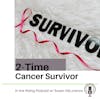Rising Above Cancer Fatigue: Strategies for Reclaiming Energy and Well-being
Feeling utterly drained and powerless isn't just a symptom of a bad day; it's a daily reality for those battling cancer fatigue.
Join me, Bettina Brown, as we unpack the exhausting journey that often accompanies cancer treatment.
But it's not all about the fight; it's about finding ways to rise again, stronger and more informed.
In this latest episode, I share the power of movement over rest and the silent victories charted in a journal that might otherwise go unnoticed.
Thank you for your time and interest in this podcast! I invite you to leave a heartfelt review on whichever podcast platform you listen to. It does so much to bring exposure to the podcast and helps lift others up!
To leave a review and help us spread the contents of this podcast, click on this link! Thank you!
Connect with me!
Website: In the Rising Podcast Website
Email: Bettina@intherising.com
In the Rising Pinterest:
In the Rising Facebook
Check out the Website: Fit after Breast Cancer
In Good Health!
Bettina
00:04 - Understanding and Coping With Cancer Fatigue
09:09 - Combating Fatigue
Bettina M Brown:
Hello and welcome to In the Rising: a Health and Wellness podcast for those going through and those supporting those going through cancer. My name is Bettina Brown and I'm board certified in physical therapy, wound care and lymphedema, and you know, for me, cancer is very personal. It's affected my friends, my immediate and my not so immediate family, and therefore I created this podcast and FitafterBreastCancer.com to address the multiple dimensions of our lives during and after recovery. Welcome to this episode where we're going to talk about something super invigorating cancer fatigue. Why does it occur and how are we going to cope with this?
So, with my own clients, this is something that we talked about, I would say 50 to 60% of the time, and it was often a comment of wow, I did not know I could be this tired and still have so much of my day left. Or you know what, Bettina? I don't understand how I have an entire day of activities and I only have energy till about 1130 in the morning. You know, Bettina, I feel like there's this monkey or elephant some days just on my back and my muscles don't have energy. I'm mentally fatigued and I'm just tapped out. And so it did not matter what kind of cancer any of these individuals had cancer itself. Just the diagnosis the emotional toll and the actual mental toll that this can take on your body is real. So a lot of us, when we're given this diagnosis, we're like going to power on through this.
We're going to go into treatments, we're going to overcome this, we're going to fight this and yes, there's a lot of research that says if you have more of a fighting attitude you will actually do better. Actually, a lot of research just says your attitude itself will help you improve and you have a higher quality of life. But the reality is that having emotions still wrapped up in processing not only the diagnosis but emotions dealing with the grief of what you were expecting from your life, expecting to do in two weeks, expecting to go on that vacation, expecting to do X, y and Z and now you have weeks or maybe months worth of treatment. Also the emotion of fear. How am I going to pay for some of my bills?
That was a huge one for a lot of my clients. How am I going to pay for all of these co-pays? How am I going to still maintain my job? How am I going to help my child? What if something happens and I'm not there to do A, b and C. Fear is also a strong emotion that can be motivating, but it is just as strong as emotion that can be depleting. Having an ability to talk with someone. In a lot of cancer treatment centers have someone that will talk about your distress level with you and what are your resources, and having a navigator through your journey to make sure that you don't have to have everything in your mind all the time, but we know it often is the case. Let's talk about hormone changes. So for many cancers, hormone therapy is a type of treatment and changing the hormone levels in your body can lead to some significant fatigue.
Our hormones are our cycle that that cortisol in the morning that we are feeling and is supposed to wake us up, and that melatonin at night that is supposed to calm us back down to go to sleep. Well, those are hormones. A lot of us don't even recognize that that melatonin supplement we take is hormone therapy. It's not just another vitamin or supplement. We use our hormones to regulate our day and we don't have to be aware of it. So when those hormones have a dysregulation, we can feel out of touch with our own body. Not feeling in touch with our body leads to lack of sleep, and so if you're sleeping less at night or you're feeling very interrupted you're always waking up at two or three in the morning you have fatigue. There's all the cycles that we got to go in and out of different brainwaves, different the REM sleep and then the not.
We need that, we need that. We need that to actually recover, not only mentally, but to put the pieces of the day together. A lot of our processing, our mental processing, happens when we sleep, and so sleeplessness for an extended amount of time makes us feel a little less in control over the things we still have control over, and that certainly does not help us feel like we're doing anything.
Well, and let's not forget nutrition. When we're really stressed out, some of us kind of go to one pendulum and or the other like we're eating a whole lot or we're not eating at all. But the reality is just having cancer, just undergoing treatment, means your body needs different energy requirements than it would normally if that was not what you were going through. But how do you take in enough nutrients and not just supplements from pills, but literally nutrients from food when you have nausea and vomiting, making it difficult to eat and, depending on the cancer in the site, sometimes you're not even able to mechanically take in food.
So nutrition has the way of wearing you down if you don't have enough of it. Some of our medications can also lead to extra fatigue or indifference. So I'm going to take a pin right here and talk about one thing that I know the most about, and that's the lack of exercise. That's that E word that a lot of people don't like to talk about, and I myself am not always a fan of exercising. I like to move. I don't always necessarily want to exercise, but I love the idea and the concept that the lack of movement can also make you feel tired, and it almost seems counterintuitive that moving more will give you more energy. But if you think of it like the spokes on a on a bicycle, what you put in will continue to rotate around and kind of spew back out at some point in time. What does that really mean? Do we even have all of the answers to support exercise?
Nope, no, we don't. They're still doing a great deal of research on this. The University of British Columbia is looking into this right now and really diving into all of the different cascades, but what we do know on a superficial level is that movement helps improve your fatigue. Now there are all sorts of different movements that you can do. We all know about yoga. You do not have to do goat yoga. You can do regular yoga, especially for the meditative properties. Again back to attitude. But just strength training is very important. Cardiovascular activity they're showing that hit workouts are great, high intensity for a very short amount of time. But we even know that some resistive strength training is helpful as well.
So what does all of that mean? When you're looking through, I think some of us have more of a propensity or a desire to do one over another. Some will love a treadmill over an elliptical or the other way around. Others absolutely love weight training. But if you get them on an elliptical or a treadmill, good luck. I think, ultimately it's which. Which of these do you really think you can do on a regular basis?
And regular can be 15 minutes, 20 minutes, three times a week or higher. But that little bit of movement really does add up into your body, and I would not say add up, but become exponentially important for you to help reduce your fatigue. When we are fatigued, we tend to become a little more sedentary. And when we're more sedentary we're weaker, and when we're weaker we legitimately cannot do as much as we could before, which does affect us, which does affect us. So if we can commit to actually moving our bodies, working on some good sleep and addressing our emotions, that will do so much to start to slowly work on our fatigue.
And since slow is really the key here, it may not be a bad idea to journal it. Write down what you've done every day and at the end of the week or the end of the month, how do you really feel? Because when we feel these small incremental changes, it's so easy to give up and say it's not making a difference. But when you have it there in black and white, in your own handwriting, legitimately not lying to yourself, you can see the difference and when you see that spark of change that gives you that energy to continue on, to continue to work and address your fatigue. So thanks so much for listening to this podcast episode.
And since we talked a little bit about nutrition, I wanted to share with you that I have a link down below to some wonderful Mediterranean recipes. Mediterranean because it has the most research to support that it helps reduce your risk of cancer and helps reduce your risk of recurrence. It's never too late to start eating well and moving your body.
Until next time, let's keep building one another up!



![Episode image for [ITR Short] Triumphs and Reflections of a Cancer Conqueror Episode image for [ITR Short] Triumphs and Reflections of a Cancer Conqueror](https://images.podpage.com/https%3A%2F%2Fstorage.buzzsprout.com%2Fojfqdzb8zfyjt3ao84o1w4cbto8b%3F.jpg?auto=format%2Ccompress&w=100&s=75ff4af7f7137349cf8af82f22fbc34b)
